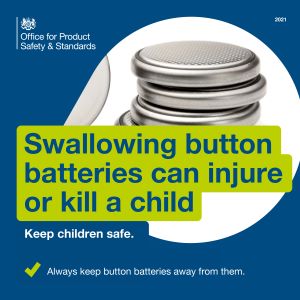Button batteries also called LR44 batteries, button cell batteries, or coin batteries, are extremely dangerous to children if swallowed. They can be found in toys, remote controls, car keys, musical greetings cards, and small electronic devices such as calculators and weighing scales.
Although a child may not choke if they swallow a button battery, the batteries can do serious internal damage. When combined with saliva, the electrical current from the battery produces caustic soda that can burn through the throat or stomach and can cause further damage to other internal organs.
RoSPA advice for keeping child safe from button batteries
- The Toy Safety Regulations require toys that use button batteries, have lockable battery compartments. Check that these are secure and undamaged and do not use toys that don’t have lockable compartments. Take care when changing batteries to make sure the compartment is secured afterwards and the old battery is disposed of safely.
- Be extra vigilant with items including musical greeting cards, flameless candles, remote controls and electronic devices as most of these will not have lockable compartments. RoSPA advises that children should not be allowed to have access to these products if the battery compartment is not secure.
- Ensure that spare batteries are locked away, and used batteries are disposed of correctly as they can still cause injury. Once they are replaced, store them securely out of reach, and recycle them as soon as possible.
If you think your child may have swallowed a button battery, seek medical advice immediately. Remember that the saliva in their body will react with the battery and so time is very much of the essence. It is sometimes difficult to know whether a child has swallowed a button battery. If they are vomiting fresh, bright red blood you absolutely have to get them immediate medical help. Click here for other symptoms to look out for.
E-cigarettes battery safety
In the UK there have been reported rare incidents of E-cigarettes or “vapes” exploding and seriously injuring people. Some of the risk around vaping and e-cigarettes is related to their batteries and how they’re charged, used and stored so following the safety tips below may help you to avoid an E-cig battery fire or explosion:
- Only buy E-cigarette devices from reputable retailers. Don’t buy counterfeit goods. Fire risks around vaping often come from counterfeit or faulty products.
- Only use the charger that was supplied with the E-cigarette / battery for charging.
- Don’t charge your E-cigarette overnight and regularly check your device when it is charging.
- Unplug your E-cigarette when it is fully charged. Don’t leave items continuously on charge (after the charge cycle is complete).
- Charge your E-cigarette on a clean, flat surface and away from anything that can easily catch fire. Ensure you can clearly see your E-cigarette when it is charging.
- Do not cover batteries that are on charge, in case of overheating.
- Ensure that you read and follow the safety instructions, markings or warnings on or supplied with the E-cigarette. Contact the manufacturer if you have any further questions or if your E-cigarette wasn’t supplied with instructions.
- Consider using E-cigarettes with safety features and don’t remove or disable safety features.
- Never let your battery come into contact with metal items such as coins or keys in a pocket or bag, as this can cause a short circuit and explosion. Store removable and spare batteries in a plastic case to prevent accidental contact.
- Protect batteries against being damaged, crushed or punctured and do not immerse in water.
- Keep batteries out of the reach of children.
- Regularly inspect your E-cigarette batteries and replace your battery immediately if it is damaged, leaking or not functioning properly. Dispose of batteries at recycle or disposal points.
- Protect your E-cigarette battery from extreme temperatures by not leaving it in direct sunlight or in your car on a freezing cold night.
You can find more information about E-cigarette battery safety at the end of this document and on the UK News download page: E-cigarette battery poster (351 downloads ) and Button batteries be aware campaign poster (407 downloads )
